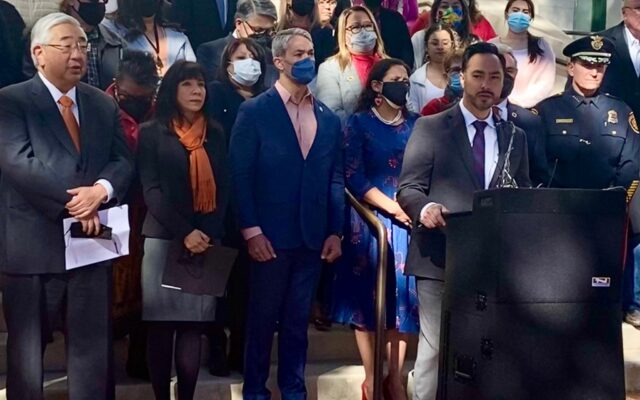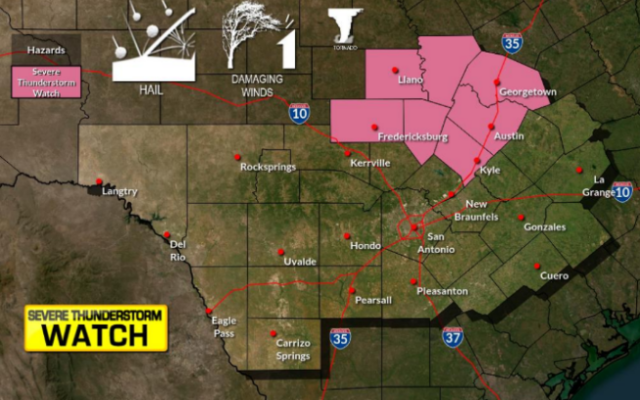San Antonio, county leaders discuss family and dating violence

SAN ANTONIO (KTSA News) — As the city of San Antonio reels from the deaths of two children at the hands of their parents, city leaders convened on the steps of City Hall on Valentine’s Day to talk about family violence.
Members of the Collaborative Commission on Domestic Violence spoke on Monday morning to put the spotlight on domestic violence and to raise awareness that February is Teen Dating Violence Awareness Month.
“It may seem a little strange to meet on Valentine’s Day to discuss domestic violence,” Deputy City Manager and CCDV Co-Chair Maria Villagomez said. “But we know that domestic violence occurs inside relationships that often start as loving and become unsafe. We want to share the message that love and feat should never co-exist in a relationship.”
The CCDV consists of multiple city and county agencies that joined forces in 2019 to create a true collaborative effort to tackle the ongoing and increasing reports of domestic violence in San Antonio.
Child abuse goes hand-in-hand with domestic abuse and San Antonio has seen a 25% increase in reports, CEO Family Violence Prevention Services Marta Pelaez said.
“When domestic violence occurs in the presence of children, even if they are not touched, it traumatized them in very unique, profound and lasting ways,” Pelaez said. “If that is not addressed and understood, we will never break the cycle of generational violence.
Officials spoke of the two children killed in San Antonio last week. Both died on February 5.
12-year-old Danilo Coles and 5-year-old Mercedez Losoya endured punishments at the hands of at least one of their parents that left them unresponsive when they were transported to area hospitals where they were later pronounced dead.
“As a community, we must have some uncomfortable and difficult conversations about the cultural elements that contribute to the high incidence of domestic violence in our city, the culture of family life, the culture in the workplace,” Pelaez said.
According to the group, one in three women in Texas will experience some form of domestic abuse with 4% to 8% of women experiencing domestic violence during pregnancy and 25% of women who have experienced abuse in relationships began that relationship before the age of 18.
The number of women killed in Bexar County by intimate partners has tripled over a five-year period, Rep. Joaquin Castro said.
“Domestic violence isn’t just a policy problem, it is in fact a community problem,” Castro said. “But there is no question that federal legislation and federal funding must be coordinated with local efforts.”
Federal lawmakers are debating the reauthorization of the Violence of Women Act with Republicans stalling over a proposed gun safety provision referred to as the “boyfriend loophole” that allows individuals convicted of domestic violence against a partner they are not married to purchase guns.
Senators introduced a version of the bill without a measure closing the loophole on Friday, with Senator Dick Durbin stating the closure of the boyfriend loophole became so controversial they had to remove the provision. He also said he supported a separate vote on the provision.
DA Joe Gonzales said his department has worked to restructure the county court’s approach to litigating domestic violence cases by increasing the number of available prosecutors from 22 to nearly 40, increasing the number of county courts that take on these cases from just two to 11, and shortening the intake process to 30 days. Recently, two temporary courts and a new CPS court were created to further assist with the backlog.
Mayor Ron Nirenberg said that $4.4 million dollars have been earmarked in the FY 2022 budget and an additional $9 million from American Rescue Plan Act funds as an investment into long term strategies to tackle this persistent and growing issue.
Sheriff Javier Salazar said the court backlog is two-fold: One aspect is isolating conditions brought about by the COVID-19 pandemic exacerbating domestic violence situations and the other is the courts delaying jury trials as a result of the pandemic.
“So now that things are starting to open back up, we’re starting to find out more about it,” Salazar said. “Victims are going back to work and victims are going back to school. They’re crying out and they’re letting us know. It’ll probably be months or even years before we get a full picture of how [the rates of domestic violence have increased.]”
The delay of jury trials means there is not only a backlog of inmates in jail awaiting prosecution but also victims that are not getting the justice they deserve, Salazar said.
The collaboration has highlighted the multipronged approach needed to tackle this multifaceted issue.
“When it comes to domestic violence, there is no finish line,” Police Chief William McManus said. “We have more work to do and we cannot just arrest this problem away.”
San Antonio Metro Health and University Health in addition to area medical and legal non-profits like Texas RioGrande Legal Aid, P.E.A.C.E. Initiative, and Family Violence Prevention Services are part of the collaborative effort.
Almost 100 attorneys were trained in a pro-bono protective order project in conjunction with Texas RioGrande Legal Aide and the San Antonio Legal Serviesd Assocication.
The pilot hotline was created in partnership between the Southwest Texas Regional Advisory Council, the Bexar County Sheriff’s Office, Family Violence Prevention Services and Metro Health. The hotline launched in August and be reached 24-hours a day, 7 days per week at 210-207-1878.
The hotline is also available for law enforcement officers to call when a domestic violence situation has been identified so that officials can conduct a lethality screening to identify high-risk and medium-risk victims.
Victims who are identified by law enforcement or through other methods have access to safety, shelter and other support services including a pilot domestic violence hotline to connect victims to options and resources.
Additional resources include:
- Family Violence Prevention Services 24/7 hotline: 210-733-8810
- National Domestic Violence Hotline: 1-800-799-SAFE (7233)
- National Teen Dating Violence Hotline: 1-866-331-9474
- Texting support is available by texting LOVEIS to 22522
- LGBT National Help Center: 1-800-246-7743
- StrongHearts hotline for Native American and Alaska Native teenagers: 844-7NATIVE (762-8483)
“On this Valentine’s Day, we want all women at risk to know that love is our community coming together to break the cycle of abuse. We are here and ready to help you,” University Health System Chief of Behavioral Health Dr. Sally Taylor.
You Might Also Like



